African and Afrodiasporic Mobilities and Identities
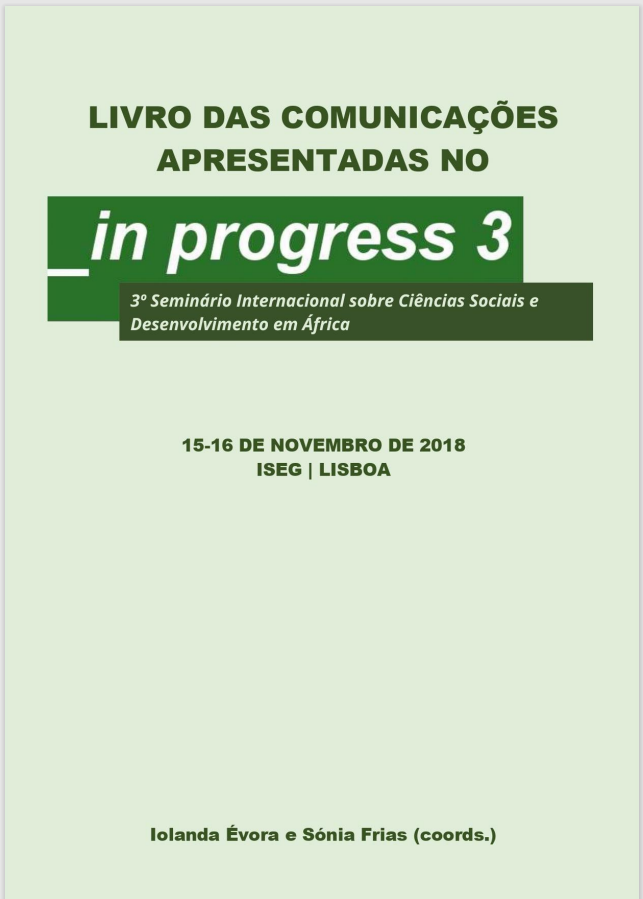
Book of Papers Presented at the In Progress 3 Seminar
Abstract:
This third edition of In Progress, Seminar on Social Sciences and Development in Africa brings together works by researchers and postgraduate students whose study and research theme is contemporary Africa and its development, supported by scientific currents that stimulate new approaches beyond the “development”, exploring the notions of “well-being” or “good living” and remaining close to currents of thought and debates between Africa, Asia and Latin America. The texts include themes such as: fieldwork: practical, theoretical and methodological issues; politics, civil society dynamics, development; culture, thought and change; strategies for cooperation and development; and populations, mobility and well-being. The second part of this work contains the reflections of the speakers invited to the In Progress 3 seminar, which include both a critical perspective on the dominant discourses and methodologies in the field of development policies linked to mobilities, economy and identities, as well as the contribution of financial growth for economic growth and several of the issues to be taken into account in discussions on economic sustainability, taking the example of SADC member countries. The final conference refers to the times and questions that are important to retain and what is important to reflect on in the context of social and human sciences, in particular, when the debate is about the (neo)colonial perspective and contemporary global challenges for African Studies.
Cite this e-book:
Évora, Iolanda e Sónia Frias (coord). 2024. Livro das Comunicações Apresentadas no In Progress 3 com Revisão por Pares : 15 a 16 de Novembro de 2018 no ISEG/ULisboa. Lisboa: ISEG – CEsA
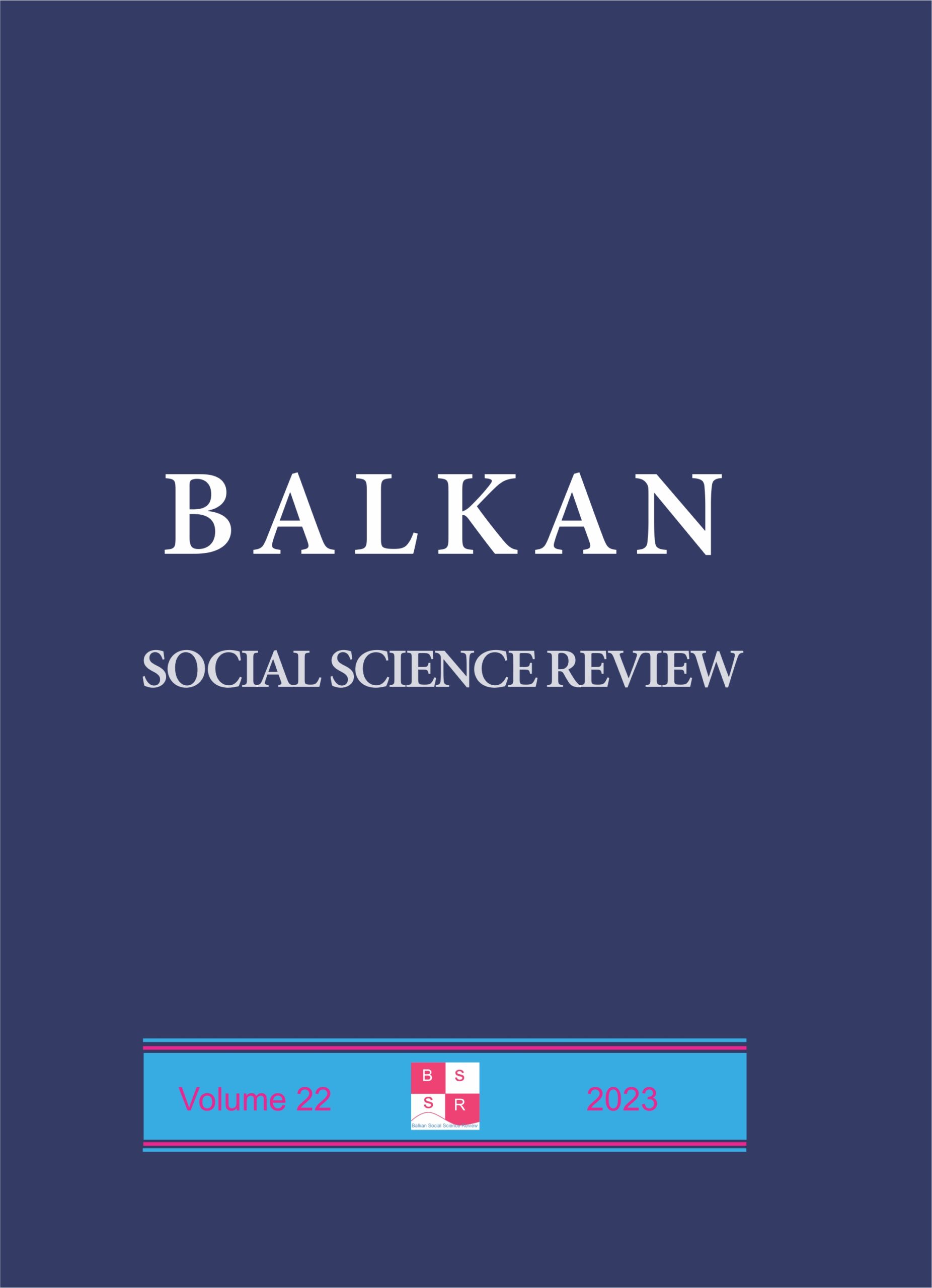
Understanding Social Realities of Internally Displaced Persons (IDPs) in the Federal Capital Territory of Nigeria (FCT), Abuja
Abstract:
This article examines the social realities of forcibly displaced persons in Nigeria, with a focus on internally displaced persons (IDPs) in the Federal Capital Territory (FCT) of Nigeria, Abuja. Internally displaced persons are individuals who have been forced from their homes or habitual places of residence and, unlike refugees, have not crossed the borders of their country. They remain under the primary protection of their governments and often seek refuge in their own countries. This study draws on secondary data sources and primary data collected from two IDPs campsites, arguing that most IDPs in the FCT, displaced by the Boko Haram insurgency live in makeshift and inhumane informal settlements in the peri-urban areas of Abuja City. These settlements also host the urban poor and other economic migrants in the country’s capital, occasionally leading to conflicts between them. The paper calls for the government to recognise the presence and condition of IDPs in the FCT and to work with relevant organisations to provide durable solutions to ensure that displaced persons can once again become productive members of society.
Cite this article:
BA-ANA-ITENEBE, C. A.; EDO, Z. O. (2023). Understanding Social Realities of Internally Displaced Persons (IDPs) in the Federal Capital Territory of Nigeria (FCT), Abuja. In: Balkan Social Science Review, Vol. 22, 213-231. https://doi.org/10.46763/BSSR232222213bai
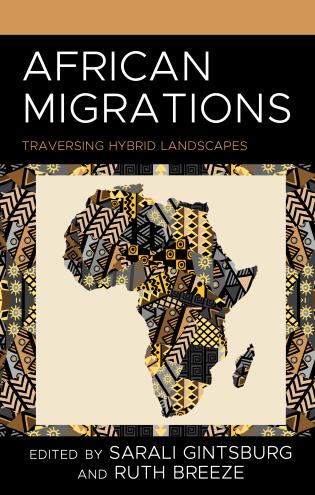
From Angola to Portugal: Narrating Migration, Memory and Identity in Djaimilia Pereira de Almeida’s Work
Abstract:
Based on the teoretichal perspetives of Lusophone Postcolonial Studies, in dialogue with other analytic tools from Feminist Studies, this chapter aims to explore the topics of migration, memory and identity through the close reading of two works of fiction by the Portuguese writer of African descent Djaimilia Pereira de Almeida (1982), who was born in Angola and grew up in Portugal. In the autofiction That Hair (Tin House, 2020; originally published in Portuguese as Esse Cabelo, 2015), as well as in the novel Lisbon, Luanda, Paradise (Lisboa, Luanda, Paraíso, 2018), the main characters move from Angola to Portugal for personal or family reasons and seek to redefine their identities. They give voice to memories and narratives that involve the relationships between the colonial past and the building of contemporary postcolonial identities. In particular, the chapter analyses the representation of both the place of orign and arrival to portray the complex socio-cultural and migratory identity landscapes that emerged during Portuguese colonialism, as well as following the decolonization in Lusophone Africa (1975). In this regard, incluiding also a brief reading of the most recent novel by Almeida, Maremoto (2018), the chapter pays special attention to the perceptions and experiences of the city of Lisbon by narrators and protagonists who are immigrants, in order to reflect on the contemporary configurations of a postcolonial city on the periphery of Europe.
Citation:
Falconi, Jessica (2024) “From Angola to Portugal: Narrating Migration, Memory and Identity in Djaimilia Pereira de Almeida’s Work” in S. Gintsburg & R. Breeze (eds) Afriacan Migration: Traversing Hybrid Landscapes. Lanham: Lexington Books, p. 15-35.
https://rowman.com/ISBN/9781666938708/African-Migrations-Traversing-Hybrid-Landscapes
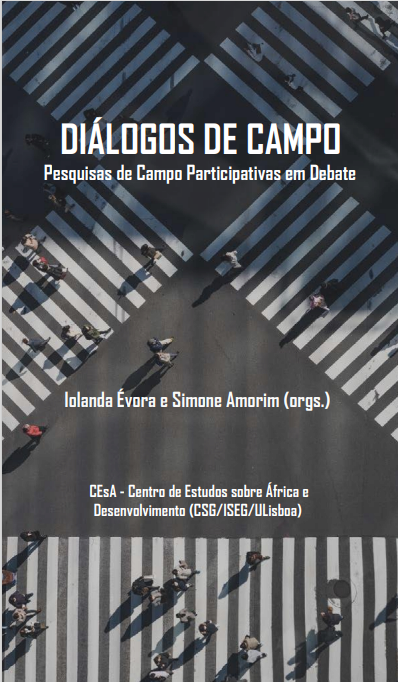
Diálogos de Campo – Pesquisas de Campo Participativas em Debate
Abstract:
This volume brings together concerns that serve as the basis for a continued debate on the mutual implications of research in the field of Social Sciences. The texts start from the common observation about the weakening of demands about “how we do it” in social research and deal with aspects related to fieldwork that are increasingly losing space in academia, essentially focused on producing results. From the fields of Social Sciences, Cinema, Literature, and Psychology, among others, the themes move between the dimensions of power hierarchies in research and the contexts that exponentiate them; the position and positionality of the researcher, and where we are placed by our interlocutors or people in the situations addressed. Specifically, they reflect on participatory methodologies and changes in knowledge production; ethnography and epistemic decolonization when the researcher does research in their life context; the interferences and determinations dictated by the field, during research; collaborative or participatory research, whether with refugee associations, in the field of artistic training or action research on bicycles and the city. Furthermore, the researcher’s subjectivity and writing regarding anti-racist cinema are addressed; as the implications of the researchers themselves in researching topics such as the impact of the pandemic on women, cultural heritage, or an object present, simultaneously, on different continents. The classic questions of the debate on methodology are present, which are, in fact, the foundations of current affairs, bringing different nuances of the contemporary debate, in social research, at a time when easier access to information reduces the distance and access of society (and the subjects of social research) to the knowledge about themselves produced in academia. This book was designed within the scope of the methodology workshops of the Afro-Port project (FCT/CEsA) and coincides with the project’s objective of contributing to a program in horizontal methodology and grounded methodology that is original, innovative and transdisciplinary, sustained by the interest in dialogue between academic and non-academic/scientific and non-scientific discourse.
Quotation:
Évora, I. e Amorim, S. (2023). “Diálogos de Campo – Pesquisas de Campo Participativas em Debate”. Lisboa, CEsA/CSG. ISBN 978-989-54687-4-4
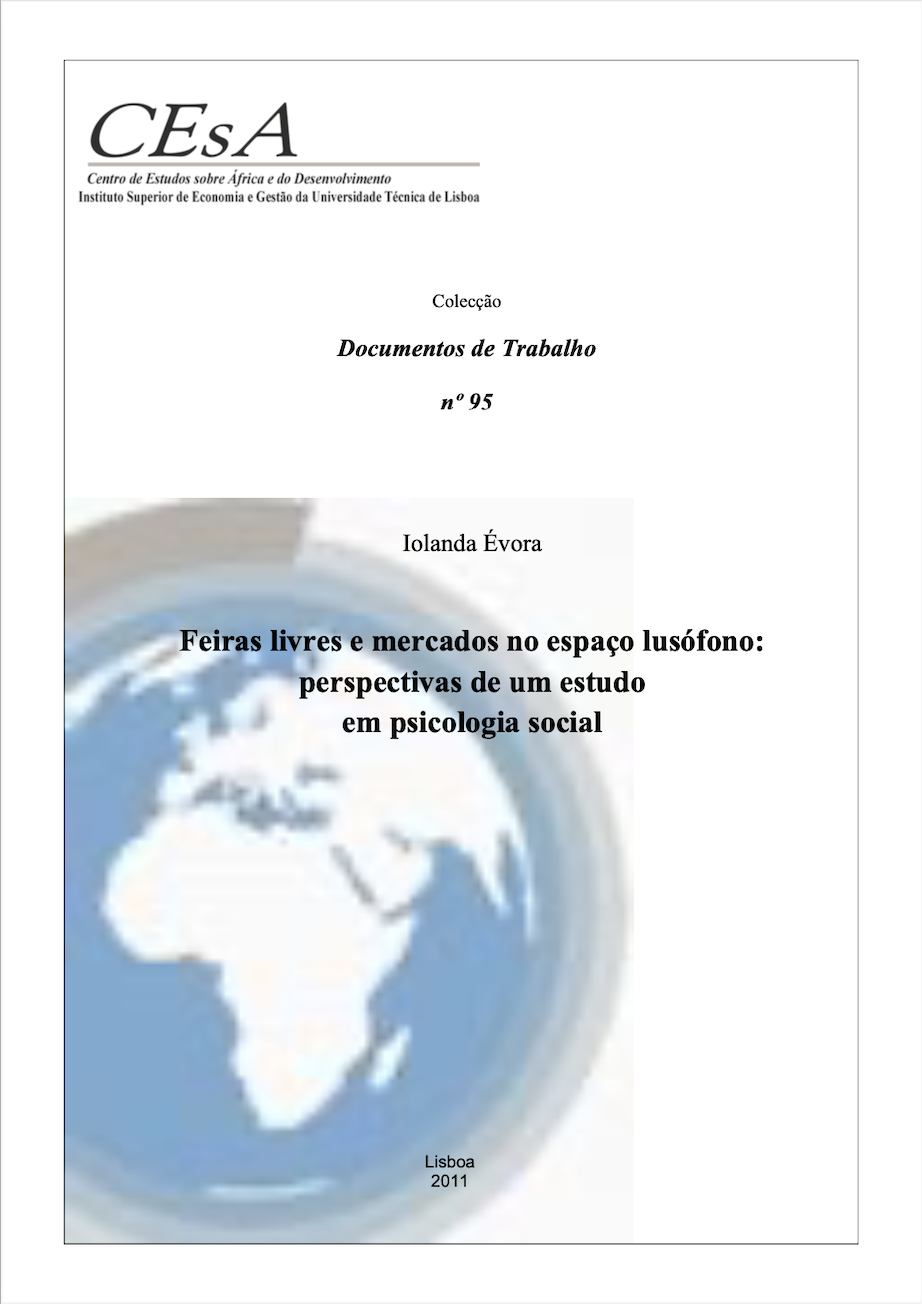
Working Paper 95/2011: Feiras Livres e Mercados no Espaço Lusófono: Perspectivas de um estudo em psicologia social
Abstract:
This communication proposes a reflection on the research methods to be applied in the study “Feiras Livres e Mercados no Espaço Lusófono: Perspectivas de um estudo em psicologia social”. The interest in the field is due, in the first place, to the type of study to be carried out and to the singularities of the proposed project, such as the fact that it will be carried out in the cities of Bissau, Praia and São Paulo, involving researchers from different areas of science and propose a field work with the subjects. Fairs and markets constitute the empirical objective of this study, presenting themselves as important universes of human activity and survival that mark the urbanity of capitals in the Portuguese-speaking space. The aim is to study the components and conditions for building a work base that will enable workers in markets and fairs to generate income through work in micro-enterprises. The study must identify and describe the material and psychosocial conditions that made it possible to become a worker in these free markets, building and acquiring the knowledge to be included in this work activity.
Quotation:
Évora, Iolanda. 2011. “Feiras Livres e Mercados no Espaço Lusófono: Perspectivas de um estudo em psicologia social”. Instituto Superior de Economia e Gestão – CEsA Documentos de Trabalho nº 95-2011.
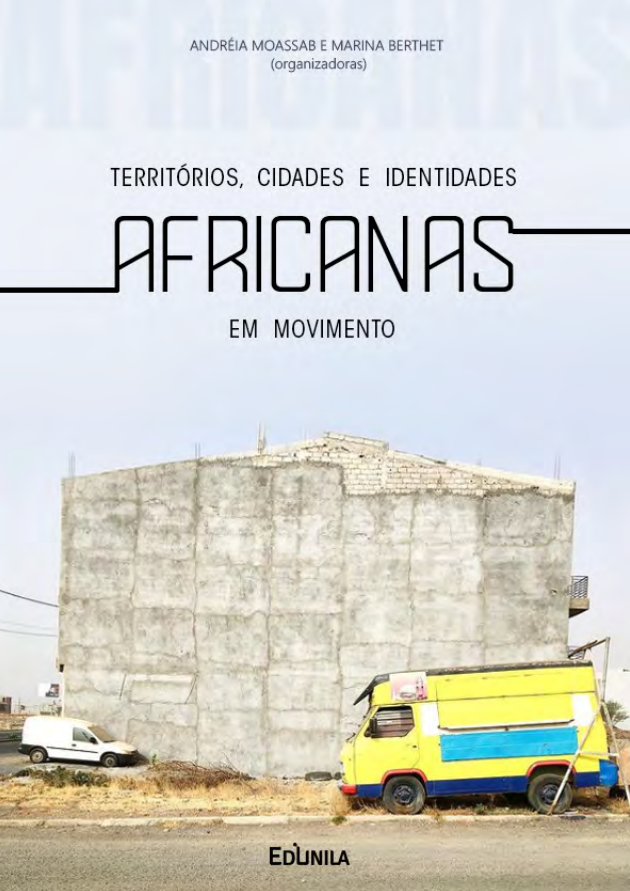
Hip-hop em Cabo Verde: rap e representação do espaço público na cidade da Praia
Abstract:
In Hip-hop em Cabo Verde: rap e representação do espaço público na cidade da Praia, the author studies how, despite the strong link with Portugal and the existence in that country of numerous rap groups composed of Cape Verdeans or descendants of Cape Verdeans, the hip-hop produced there is practically ignored and very little consumed by young people, particularly those from the periphery, to the detriment of the culture of North American black ghettos, known through the audiovisual flows of the digital era. Young people all over the world are seen as a risk factor, an association that is particularly patent in the modern discourse on security, especially in an era in which a part of young people associate themselves with street gangs, revealing “the failure of the expected reproduction of the support mechanisms of an expansive and optimistic capitalism”, which provides the so-called “Welfare State”. Thus, in the face of a feeling of juvenile unease, evidenced in some actions that destabilize the social order and the “Creole morabeza”, it becomes mandatory that the institutions that protect this population layer control them, reprogramming them institutionally, thus building a State Social Service.
Quotation:
Lima, R.W. (2022). Hip-hop em Cabo Verde: rap e representação do espaço público na cidade da Praia: In Territórios, cidades e identidades africanas em movimento. Andréia Moassab, Marina Berthet (Orgs.), 119-133. Foz do Iguaçu: EDUNILA, 2022. ISBN: 978-65-86342-32-1

África, o berço da modernidade: por uma visão pós-colonial da modernidade e do território
Abstract:
In África, o berço da modernidade: por uma visão pós-colonial da modernidade e do território. In Territórios, cidades e identidades africanas em movimento, the author starts by taking a brief look at what is conventionally called modernity and what constitutes the substratum on which the “West” anchors itself for a triumphant and universalist autonarrative. Various authors, mainly from the mid-eighties onwards, have sought to demystify the origins of Western civilisation and modernity, most notably the three volumes of Black Athena: The Afroasiatic Roots of Classical Civilization (1987/1991/2006), by Martin Gardiner Bernal.2 Other authors have followed in Bernal’s footsteps to some extent, one of them being the philosopher and historian Enrique Dussel with his work Política de La Liberación: Historia Mundial y Crítica [Liberation Policy: World History and Critique] (2007): World History and Critique] (2007), in which, situated in the field of postcolonial theory, he argues that Hellenocentrism is the father of Eurocentrism and that, given that the so-called “Greek miracle” by the German Romantics of the eighteenth century does not exist, this means having to start “anew” the history of political philosophy. To this end, he considers it essential to redefine the beginning of modernity. It is worth pointing out that it is “postmodernity” – called the historical period that seeks to overcome, or surpasses, modernity – that will give rise, in Western academia and its satellites, not only to a debate about the “postmodern condition” – or about its being the “cultural logic of late capitalism” – but also about the “vision” of modernity itself. Although many prefer expressions other than “postmodern”, or change their preference -such as Zygmunt Bauman, who starts talking about “liquid modernity”, or Gilles Lipovetsky, who prefers the term “hypermodernity”, or others who talk about “incomplete modernity”, or “late modernity” or “alternative modernities”-, in essence they do not put the emphasis on a critical analysis of the hegemonic Anglo-Saxon periodisation of modernity.
Quotation:
Barros-Varela, O. (2022). África, o berço da modernidade: por uma visão pós-colonial da modernidade e do território. In Territórios, cidades e identidades africanas em movimento. Andréia Moassab, Marina Berthet (Orgs.), 11-31. Foz do Iguaçu: EDUNILA, 2022. ISBN: 978-65-86342-32-1
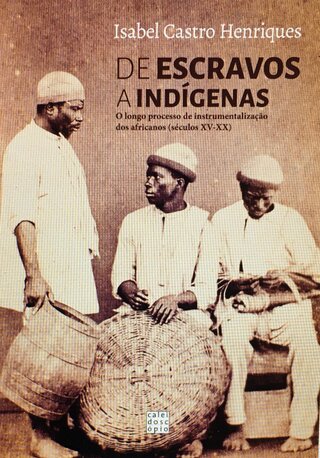
De escravos a indígenas: O longo processo de instrumentalização dos africanos (séculos XV-XX)
Abstract:
De Escravos a Indígenas: o Longo Processo de Instrumentalização dos Africanos (Séculos XV-XX), which brings together a set of texts written over forty years and dispersed in publications of diverse nature, not always easily accessible, aims to contribute to a renewal of historiography on the relations between Portugal and Africa, in the specific field of the forms of instrumentalisation of Africans carried out by the Portuguese for almost five centuries. A long process, whose internal nature proved capable of metamorphosis and reconversion in the nineteenth and twentieth centuries, ensuring the continuity of the violent ‘use’ of African populations, resorting to a new classificatory apparatus – savages, indigenous, assimilated – aimed at keeping Africans within the sphere of Portuguese domination, contributing to legitimising their enslavement and fixing distorting interpretations of History.
If a first line of study aims to review the history of slavery and slave trafficking and their ideologies in spaces of Portuguese ‘occupation’ like Angola, a second line of study privileges iconographic documents as historical sources, emphasizing their historical and informative dimension. Finally, the third line of this study seeks to highlight the evolution of the process of Portuguese instrumentalisation of Africans, which resorts to unprecedented classificatory categories – savage, indigenous, assimilated – and to practices that emerge from the slave labour of the past to ensure the colonial exploitation of African populations.
Value judgments, commodification, objectification, exploitation, ridiculing of African men fabricated Portuguese imaginaries that reduced the black/African to slavery, the savage/indigenous to lazy, thieving and drunk, the assimilated/’civilised’ to a ridiculous and negative copy of the white/Portuguese, enshrining the inferiorization of Africans, and in the same movement, glorifying the Portuguese ‘race’, hierarchizing the humanities and valuing the dimension and nature of the Portuguese actions, first slave-owning and then colonialist, that have left their mark on Portuguese society to this day.
Quotation:
Henriques, Isabel C., De Escravos a Indígenas: o Longo Processo de Instrumentalização dos Africanos (Séculos XV-XX), Lisboa, Ed. Caleidoscópio, 2019.
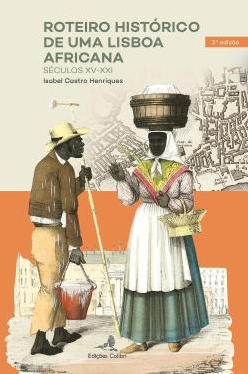
Historical Guide to an African Lisbon
Abstract:
Lisbon, a city of as many valleys and hills as there are myths surrounding its history and the people who invented it, stretches along the Tagus, where the river ends its course through Iberian land and plunges into the Atlantic Ocean. Lisbon was born on the hill of São Jorge Castle, where a Bronze Age settlement left its traces, which crossed with many other marks engraved by Greeks, Phoenicians, Lusitanians, Romans, Visigoths, Arabs, Jews and Christians. A long road of people and cultures, of stories and legends, of gods and heroes who, like Ulysses the mythical founder of the city – Olisipo – which owes its name to him, built and rebuilt this urban space. The aim of Historical Guide to an African Lisbon, XV-XXI Century is to show Lisbon’s Africanness, dispersed in a plurality of memories and immaterial and invisible traces in the days in which we live. History tells us about the settlement and life of thousands of Africans who for centuries took part in the process of building the Portuguese national fact. Travelling through the city, armed with historical knowledge, we are surprised by the vigorous African presence that invaded all spaces of Lisbon society, we reconstruct a hidden Lisbon, submerged by a centuries-old prejudice that still dominates our collective imagination and we understand, with greater clarity, not only behaviours, values, practices that remain in urban daily life, but also the constant reinventions of Portuguese and African identities, present in the country.
Quotation:
Castro Henriques, I. (2021). « Historical Guide to an African Lisbon, XV-XXI Century», versão revista e actualizada, Lisboa, Edições Colibri, 2021.
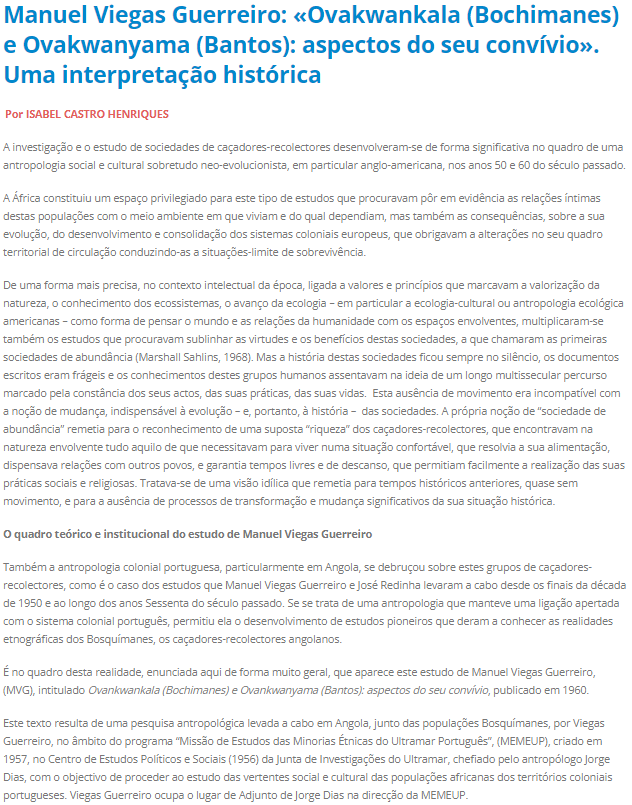
Manuel Viegas Guerreiro: «Ovakwankala (Bochimanes) e Ovakwanyama (Bantos): aspectos do seu convívio». Uma interpretação histórica.
Abstract:
The research and study of hunter-gatherer societies developed significantly within the framework of a mainly neo-evolutionist social and cultural anthropology, particularly Anglo-American, in the 1950s and 1960s. Africa constituted a privileged space for this type of study which sought to highlight the intimate relations of these populations with the environment in which they lived and on which they depended, but also the consequences, on their evolution, of the development and consolidation of the European colonial systems, which forced changes in their territorial framework of circulation, leading them to situations at the limits of survival. In a more precise manner, in the intellectual context of the time, linked to values and principles which marked the valorisation of nature, knowledge of ecosystems, the advance of ecology – in particular American cultural-ecology or ecological anthropology – as a way of thinking about the world and humanity’s relations with the surrounding spaces, there was also a multiplication of studies seeking to underline the virtues and benefits of these societies, which were called the first societies of abundance (Marshall Sahlins, 1968). But the history of these societies always remained silent, the written documents were fragile and knowledge of these human groups was based on the idea of a long, multi-secular path marked by the constancy of their acts, their practices and their lives. This absence of movement was incompatible with the notion of change, which is indispensable to the evolution – and therefore the history – of societies. The very notion of “society of abundance” referred to the recognition of a supposed “wealth” of hunter-gatherers, who found in the surrounding nature everything they needed to live in a comfortable situation, which solved their food needs, dispensed with relations with other peoples, and guaranteed free time and rest, which easily allowed them to carry out their social and religious practices. This was an idyllic vision that referred back to previous historical times, almost without movement, and to the absence of significant transformation and change processes in their historical situation. In Manuel Viegas Guerreiro: «Ovakwankala (Bochimanes) e Ovakwanyama (Bantos): aspectos do seu convívio». Uma interpretação histórica. Isabel Castro Henriques comments on the homonymous study conducted by Manuel Viegas Guerreiro.
Quotation:
“Castro Henriques, I. (2021). «Manuel Viegas Guerreiro – Ovakwankala (Bochimanes) e Ovakwanyama (Bantos): aspectos do seu convívio. Uma interpretação histórica. Lisbon, Newsletter Fundação Manuel Viegas Guerreiro, no 27, julho-setembro 2021, pp. 10-16.”





